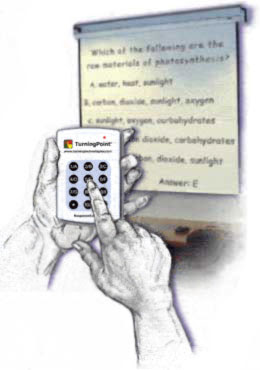How Do I Know What I Think Until I See What I Say?

Today's post is by guest writer Skoorby
Listening to the radio today, I heard a story about the use of “clickers” in a classroom at Cleveland State University. Listen here. So it appears that the clickers increase engagement and enable instructors to assess students, but do they help learning? I thought back to my experience in teaching.
I always annoyed my classes at the beginning of term (and so had small class sizes) by telling students that I would be “cold calling” – i.e., calling on them without prior notice to answer substantive questions in class, and that their participation grades would be influenced by their responses.
My rationale was that if you’re constantly trying to keep yourself ready to answer, you’re more likely to pay attention, but more importantly, you’re likely to think beyond the material to form your own view. From my exposure to cognitive psychology, I figured that cold calling would increase something called “depth of processing”, known to be an important element in shifting the content of short term memory into long term memory.
So when I heard about the clickers, I thought that they might be another way to increase depth of processing. As you think about your answer, you have to go beyond the facts. You have to express an opinion.
Then I remembered my muse, Karl Weick. A social psychologist, he once used the question “How do I know what I think until I see what I say?” to explain something about learning and acting. The point is that people don’t really have points of view on things until they have had occasion to express them. And sometimes we surprise ourselves by the opinions we express on things we haven’t previously given much thought to. Clearly, having occasions to express opinions is a prerequisite for having opinions at all.
This is where I think the clickers would work well. Normally, students don’t move beyond passive observation of course material until there’s an examination, or until a cold-hearted professor demands an answer to a question. With the clickers, they get to express opinions many times in each class. In the process, they will discover how they relate to the material, and I think they’ll learn more.

Comments